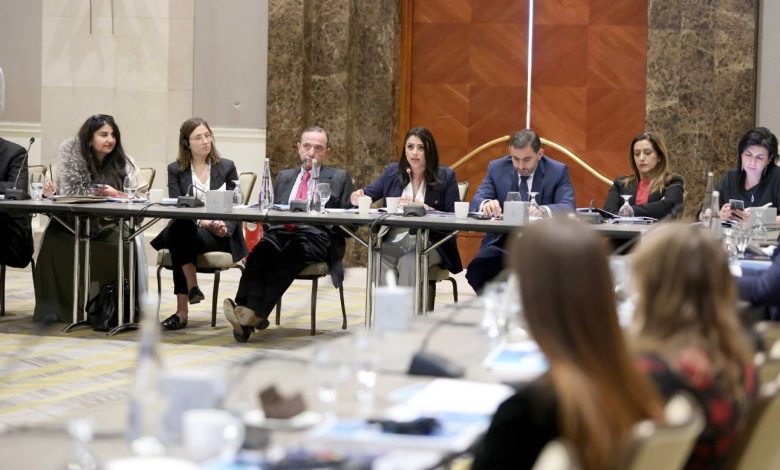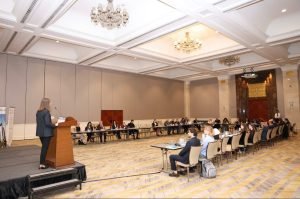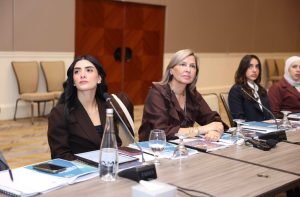
Jordan Daily – The fifth wave of the Foreign Relations Survey, conducted by NAMA Strategic Intelligence Solutions in partnership with Konrad-Adenauer-Stiftung (KAS) Jordan Office, unveiled yesterday, revealed that over 68 percent of Jordanians believe that Jordan’s regional role has increased over the past five years.
The survey, which was conducted over a nationally representative sample of 1,248 adult Jordanians, with ±2.5% margin of error, interviewed face-to-face in late July 2025, assessed the extent to which Jordanians believe the Government of Jordan is effective in fulfilling Jordan’s foreign policy objectives, NAMA said in a statement.

The data reveals that nearly 86 percent of Jordanians believe that Jordan’s foreign policy is effective at positioning Jordan as a global destination for tourism while 83 percent said the same about positioning Jordan as a regional player, compared to 82 percent for advancing Jordan’s role as a custodian of holy sites in Jerusalem, 72 percent for attracting foreign investments, and 71 percent for acquiring economic support.
The results also showed a high level of compatibility between Jordan’s foreign policy objectives, Jordanians’ perception of the efficacy with which Jordan conducts its foreign relations, and Jordanians’ perceived foreign policy priorities.
When asked about what Jordan’s most important foreign policy priority should be, 46 percent mentioned facilitating agreements to develop the economy, acquire investments, and create jobs, followed by 21 percent for advocating for the rights of Palestinians and protect holy sites in Jerusalem.

Wave 5 of the Foreign Relations Survey also revealed intriguing trends when it comes to how Jordanians view Jordan’s alliances. Value-based considerations, economic utility, and security benefits emerged paramount. Saudi Arabia and the United States were identified as Jordan’s most important political allies, with 34 percent for the former and 19 percent for the latter. The same duo also emerged as Jordan’s most significant economic partners with 36 percent for the United States and 33 percent for Saudi Arabia. They were also identified as the two main countries Jordanians would want Jordan to cooperate more with in the future.
The United States also appeared as the most favorable destination if Jordanians were to travel abroad for health treatment, work, and university education whereas Saudi Arabia was the most preferred destination for tourism, China for business and trade, and Germany for professional training.
With the exception of Iran and Israel, Jordanians assessed Jordan’s political relations as very or somewhat good with the likes of the United States, Saudi Arabia, Qatar, the United Kingdom, the European Union, Egypt, China, Canada, Germany, France, Turkey, Iraq, Syria, Japan, and Russia. The same trend was also visible when it comes to Jordanians’ preferences for the future of political relations with these countries, as most Jordanians reported in favor of strengthening, or at least maintaining the political relations, with each of these states.

Jordanians were also in favor of strengthening relations with the Gulf Cooperation Council, the United Nations, the International Monetary Fund, the World Bank, NATO, and BRICS, albeit to varying degrees.
Looking at regional geopolitical dynamics, the survey finds that 73.4 percent of Jordanians view the Middle East as unstable and insecure, marking a decrease from 91 percent reported in the previous wave conducted in August 2023. Over three quarters of Jordanians indicated Israel is Jordan’s biggest security threat, up from 49 percent when asked in August 2023.
The results also reveal that 92 percent of Jordanians strongly agree that Jordan should strengthen its military capabilities given the instability in the region, with the United States, Saudi Arabia, and Egypt identified as the countries they would support in strengthening Jordan’s military capabilities.

As for the war between Israel and Iran, 39 percent of Jordanians indicated that Jordan’s stance should be to advocate for a diplomatic resolution while 50.2 percent believe Jordan should remain neutral as 9 percent stated that Jordan should support either side.
When it comes to the Palestinian-Israeli conflict, the survey finds support for the two-state solution among 43 percent of Jordanians, up from 34 percent when asked in August 2023. Further, 51 percent of Jordanians are in favor of keeping the 1994 Wadi Araba Peace Treaty, up from 21 percent when asked in November 2023, 29.4 percent in February 2024, 42 percent in May 2024, and 46 percent in May 2025. About 46 percent indicated their support for canceling the treaty and reverting to the no-war-no-peace state that preceded it.
